Elizabeth – Last night we saw the wonderful Sondra Radvanovsky as Norma. I had seen her before at the Met in Un Ballo in Maschera, but Bellini’s Norma was really written as a vehicle for great female singers.
Radvanovsky was great, I particularly liked her first Act aria, “Casta Diva”. The sustained notes she held and controlled up and down the scales were gorgeous. The crowd was really there to see her. And that was good as Aleksandrs Antonenko as Pollione, the father of Norma’s children, got off to a surprisingly weak start. Wringing your hands, holding your breath that he makes that note, kind of weak. He did warm up at the end of the first act, but it was stressful. Good thing this opera was really about the women. James Morris as Oroveso, father of Norma, was so difficult to hear in the beginning even with the orchestra playing pianissimo I was worried about the fate of the entire show. I hear he used to be a great singer.
Kate Aldrich as Adalgisa was beautiful, especially when harmonizing with Radvanovsky. It was a pity, though, as Sandra was so head over shoulders wonderful it almost made me sad that the other women couldn’t really hold a candle to the great Radvanovsky.
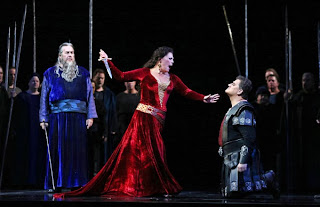 Bellini’s long, long overture gave the focus to the conductor. And there was polite applause after it. But Riccardo Frizza’a conducting was slow. I don’t know what the score calls for, but Frizza had us going at an adagio pace. It felt brutal at times, as it made Bellini’s music, which is gorgeous, feel painful and bland. Or perhaps it is in fact Bellini who is painful and bland? This is the only opera of his I have heard. And I am coming off seeing Two Boys and Nico Muhly’s very modern music. At other points, though, the conducting as in Act II’s “Guerra, guerra! Le galliche selve” Frizza was so fast that chorus couldn’t catch up. It was a situation where the tempo never felt quite right.
Bellini’s long, long overture gave the focus to the conductor. And there was polite applause after it. But Riccardo Frizza’a conducting was slow. I don’t know what the score calls for, but Frizza had us going at an adagio pace. It felt brutal at times, as it made Bellini’s music, which is gorgeous, feel painful and bland. Or perhaps it is in fact Bellini who is painful and bland? This is the only opera of his I have heard. And I am coming off seeing Two Boys and Nico Muhly’s very modern music. At other points, though, the conducting as in Act II’s “Guerra, guerra! Le galliche selve” Frizza was so fast that chorus couldn’t catch up. It was a situation where the tempo never felt quite right.And the story had a couple holes. It appears that Norma secretly had children with Pollione. Doesn’t anyone question where her kids came from? Whose children do they think they are? I wish the Met synopses weren’t so vague sometimes.
People obviously got the news that we were coming to the opera. A man at the end of our row was wearing a mask. Obviously it isn’t just us who attend the Met sick. During “Casta Diva” in Act I you could hear people hacking loudly—not during loud parts at all. Wow is there a cold endemic in NYC or what? If so I blame Shawn.
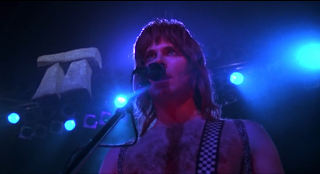 Shawn- I had never seen nor heard Norma before seeing the last performance this season. I know this is some kind of operatic sin, but my viewing repertoire has been achingly and abusively baritone heavy for much of my life.
Shawn- I had never seen nor heard Norma before seeing the last performance this season. I know this is some kind of operatic sin, but my viewing repertoire has been achingly and abusively baritone heavy for much of my life.
I very much liked the opera itself. More on that later. The production by John Copley was, however, one of, if not the least, effective I have seen at the Met. Spartan and minimalist is fine, it just didn’t work here for me. Just far too little onstage. A little can do a lot obviously but it didn’t in this production. The druid’s sacred grotto in Act One looked like a mini-Stonehenge made out of Delia Deetz’s sculptures from Beetlejuice surrounding a giant gold coin. I kept thinking of both Beetlejuice and This is Spinal Tap. This did not work for me in the context of Norma, and I love Beetlejuice and This is Spinal Tap as much as I can love anything.
The set and costumes were by John Conklin, which is odd as the costumes were gorgeous. I think they were meant to flash and sparkle in the emptiness of the set, which they did, but it still didn’t work for me.
The minimalist set woes continued throughout the performance. I kept being reminded that there were large groups of people standing around singing on a stage. And again not in a good way, in a “I am sitting in a seat in a theatre watching large groups of people singing on a stage and I wonder if I left the kettle on” kind of way.
But Sondra Radvanovsky is great. We saw her in Ballo last year, but she was in full form here. She is the best big voice I have heard at the Met as an adult. Her sound absolutely fills the house. Every inch. She is still not spine tingling to me, but as I have said in previous posts, I have come not to expect that much anymore. But she is great, world class and deserves to be center stage in every meaning of the phrase. If you’re going to have a bland Spartan staging, then by all means put Radvanovsky in the middle of it. Even if her position in the industry is somewhat attributable to the state of the art today, you’ll get your money’s worth. She was wildly received by the crowd.
Tenor Aleksandrs Antonenko flattened out on a high note in act one due to his squeeze squeeze squeezing. That kind of singing makes me tense in general, although he warmed up a bit as the evening progressed.
 |
| Jamie Barton |
Kate Aldrich as Adalgisa had it tough being on next to Radvanovsky but did her best to keep up. People I know that have seen the entire run tell me they wish they could have spilt the casts and have Radvanovsky and Jamie Barton as Adalgisa, who stepped in with Angela Meade as Norma for two performances in the run.
I hate saying this, as I love and admire James Morris, but I couldn’t hear him for the majority of the evening.
As I opened with, I loved the music, but I couldn’t help the feeling that it could be played far better than it sounded under Riccardo Frizza. And Radvanovsky gives you your full money’s worth (and plus some) for an evening at the Met, which, as I said, is a far too rare occurrence these days.
– Elizabeth Frayer and Shawn E Milnes
Related Links:
Six Characters in Search of a Murder: Two Boys at the Metropolitan Opera
Runny Noses, Russian and Otherwise: The Nose at the Metropolitan Opera
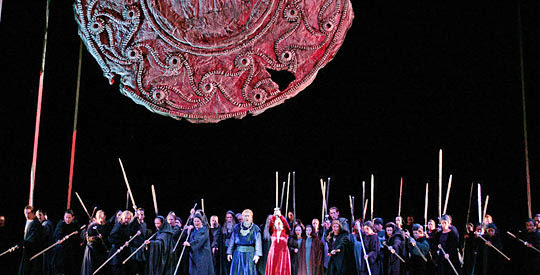
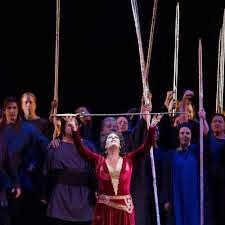
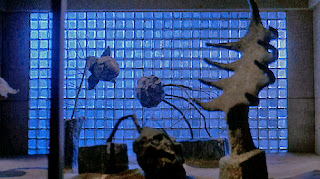
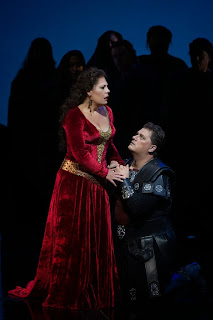


Leave a Reply